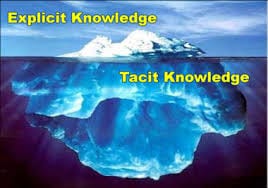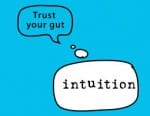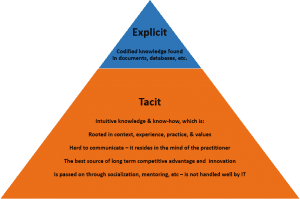It is amazing how many articles and videos I have watched lately in which they are talking about decision making based on “gut feel.” It is also disheartening how many first responders I have interviewed who have admitted to me that they have dismissed their gut feelings and proceeded to do things that resulted in bad outcomes. Let’s explore the origins of intuition.
Tacit Knowledge
To understand how you can benefit from intuition, we must first lay a foundation of where the knowledge comes that forms intuition. Your brain is constantly assessing and gathering information – some of which you do with conscious awareness and some are gathered completely unintentionally. The gathered information is stored as “patterns” of information. This information starts in short term memory and can then be forgotten or sent down the highway to your long term memory stores. How exactly this happens is a complex process beyond the scope of this article.
Once the information reaches its long term memory destination there are a number of factors that influence your ability to recall it (recency, familiarity, emotional connections, routines and repetition to name a few). Some information is recalled consciously, which is to say you have a complete awareness of the information (examples would include your home address, names, and faces of loved ones, where you were and what you were doing when specific tragic events occurred, etc.)
 Other information is not so easy to recall into conscious awareness. Simply because you cannot recall it does not mean, necessarily, that you’ve forgotten it. Occasionally you’ll have something happen (or see something… or hear something) that will cause a memory of long ago to flood back into consciousness. This is an example of tacit knowledge – knowledge that resides outside of everyday awareness.
Other information is not so easy to recall into conscious awareness. Simply because you cannot recall it does not mean, necessarily, that you’ve forgotten it. Occasionally you’ll have something happen (or see something… or hear something) that will cause a memory of long ago to flood back into consciousness. This is an example of tacit knowledge – knowledge that resides outside of everyday awareness.
Another form of tacit knowledge is the knowledge that never comes into conscious awareness, but you nonetheless know it. Take, for example, driving a car. Most experienced drivers are able to operate a vehicle at highway speeds while carrying on conversations or while thinking about things other than driving. Have you ever been driving somewhere, arrived at your destination and realized you don’t remember the drive? You really weren’t paying attention to driving (perhaps because you were talking to someone, singing along with songs, or were deep in thought)?
How were you able to safely operate the vehicle? Tacit knowledge. You were driving the vehicle with a reliance on stored information from past driving experiences (and past training… and past video games you’ve played… and past movies you’ve watched). All that subconscious (tacit) knowledge allows you to pay attention to other things and depend on intuition to guide you down the highway. It seems a little scary to think about driving this way, but we do it without even realizing it.
The reliance on tacit knowledge in driving is what gets some young drivers into trouble. They watch parents and other experienced drivers and are lulled into believing that operating a vehicle is easy (because the “expert” driver makes it look so easy). The young driver doesn’t have the benefit of stored tacit knowledge, yet they continue to talk to other passengers, talk on cell phones, text, sing along to the radio and engage in deep thought and lose track of the fact that they are driving a vehicle at highway speeds. Absent a store of tacit knowledge, the young driver does not benefit from intuition. Because they lack experience, driving is a conscious act and the brain cannot give its attention to two conscious tasks simultaneously, causing young drives to have more near-misses and accidents.
Intuition is your early warning system
 Because your brain is constantly processing and storing information it is also constantly comparing current experiences to past experiences. Perhaps stated another way, the brain is constantly comparing patterns of current environmental cues to stored patterns from previous experiences. The pattern matches are what provides you with intuition – or as it is sometimes framed – knowing without knowing how you know.
Because your brain is constantly processing and storing information it is also constantly comparing current experiences to past experiences. Perhaps stated another way, the brain is constantly comparing patterns of current environmental cues to stored patterns from previous experiences. The pattern matches are what provides you with intuition – or as it is sometimes framed – knowing without knowing how you know.
There are many, many lessons stored in your brain. There is also genetic coding based on experiences of previous generations dating all the way back to your cave dwelling ancestors. Those experiences of long ago are sometimes termed “instinct.” All creatures possess instinct, and you do too. Intuition can provide you with early warnings – often in the form of gut feelings, hair standing up on the back of your neck or feelings of impending danger or doom.
Ignoring intuition
It can be difficult to trust your intuition and make decisions based on feelings. As modern-day humans, we are trained to depend on facts and data as the foundation for good decision making. The Internet – providing access to a nearly unlimited amount of facts and data – has made it easy for us to validate decisions and rely on rational (not intuitive) decision processes.
Under stress, the brain is gathering and processing many facts, much of which is happening outside of awareness. These facts, formed into patterns, are then sent into high brain processing areas and compared to past experiences. When you get that “gut feeling” you are benefiting from intuition – a pattern match.
However, if you make a decision based purely on intuition (or gut feel) and someone asks you for the proof and evidence, you may not be able to produce it. Remember, intuition and pattern matching happen OUTSIDE your conscious awareness, so you may find yourself being unable to articulate WHY you felt the way you did but you, nonetheless, sensed something was wrong.
For many responders, this leap of faith is simply too great, so sadly, some dismiss their intuition and trudge onward into danger. If you listen to the SAMatters Show (podcast) you will hear interviews where responders fully admit dismissing their intuition and subsequently found themselves in a very bad place (many almost dying).
Self-Efficacy
 Self-Efficacy is a fancy way of saying you have confidence in yourself – unwavering confidence. To make split-second decisions, rooted in strong situational awareness, you need to trust your gut feelings. If your warning bells are going off, giving you the FEELING something is not right, GET OUT of the situation. If you are the commander, order your personnel OUT of the situation.
Self-Efficacy is a fancy way of saying you have confidence in yourself – unwavering confidence. To make split-second decisions, rooted in strong situational awareness, you need to trust your gut feelings. If your warning bells are going off, giving you the FEELING something is not right, GET OUT of the situation. If you are the commander, order your personnel OUT of the situation.
Dr. Gasaway’s Advice
 It can be difficult to trust your gut, especially when you are in the heat of a high-risk operation and the proof and evidence are not screaming out at you. If you make a decision to retreat based on intuition, you may suffer some embarrassment or criticism if you are not able to articulate exactly why you made the decision. When that happens, print this article and provide it to your critic.
It can be difficult to trust your gut, especially when you are in the heat of a high-risk operation and the proof and evidence are not screaming out at you. If you make a decision to retreat based on intuition, you may suffer some embarrassment or criticism if you are not able to articulate exactly why you made the decision. When that happens, print this article and provide it to your critic.
Action Items
 1. Discuss a time when you benefited from a feeling of intuition.
1. Discuss a time when you benefited from a feeling of intuition.
2. Discuss a time when you failed to trust your intuition and it had a consequence or near-consequence for you.
3. Discuss how you might communicate to others your “feeling” that something isn’t going right when you are lacking proof and evidence.
_____________________________________________________

If you are interested in taking your understanding of situational awareness and high-risk decision making to a higher level, check out the Situational Awareness Matters Online Academy.
CLICK HERE for details, enrollment options and pricing.
__________________________________
Share your comments on this article in the “Leave a Reply” box below. If you want to send me incident pictures, videos or have an idea you’d like me to research and write about, contact me. I really enjoy getting feedback and supportive messages from fellow first responders. It gives me the energy to work harder for you.
Thanks,

Email: Support@RichGasaway.com
Phone: 612-548-4424
SAMatters Online Academy
Facebook Fan Page: www.facebook.com/SAMatters
Twitter: @SAMatters
LinkedIn: Rich Gasaway
Instagram: sa_matters
YouTube: SAMattersTV
iTunes: SAMatters Radio
iHeart Radio: SAMatters Radio


super interesting read. I’ve been working on ‘listening’ and ‘feeling’ and ‘hearing’ my inner voice and it works. The more mindful I am, the clearer the voice. Love it!
I’ve notice quite often that when I’m happy is when my intuition works best.
This quite contradict your argument while under stressful conditions.
Stress is not the only way to access intuition. Rather it is just one of the ways. I hope this clarifies the intent of the article for you.
Pingback: 10 Sure-Fire Ways to Master Your Intuition - Mystic Wanderer
Pingback: How Much Should You “Trust Your Gut” When Buying an Online Business? - NewsWingz
Pingback: 4 Ways Trusting Your Intuition Is A Superpower
Pingback: 4 Ways Trusting Your Intuition Is A Superpower | Ezzaworld TV Reality Magazine & FM
Pingback: 4 Ways Trusting Your Intuition Is A Superpower - Bingxo
Pingback: Signs You’re Ignoring Your Intuition. Explained – The Conscious Vibe
Some of ancestors as well, as myself, have what the Irish call ‘The Sight” insofar as we know what is about to occur before it does like the phone caller you predicted. Is this “predictability” inherited as with our DNA or coincidence? Is it possible that these two features given to us by by our biological parents?
I am interested in knowing what part of the brain is at work while having intuitive thoughts. I have episodes for 2-3 days when I experience intuitive thoughts. I would like to participate any research program if available. Thank you!
Email: Annamiozzi57@gmail.com Why do I fear my intuition? My dreams are reality I see things before they happen. Sometimes what I thing I want to be positive. But then it’s negative and I have strong intuitions. Thank you
I’ve always had strong intuition to the point of almost knowing what another person is actually thinking.
Maybe I’ve been right on numerous occasions.
If I listen to my intuition it takes me on the right routes when travelling.
But intuition is intrusive and sometimes makes life difficult.
Pingback: The Intuition trap – Synergiging Bussines Coaching
Pingback: Trusting Your Intuition – Arc Integrated